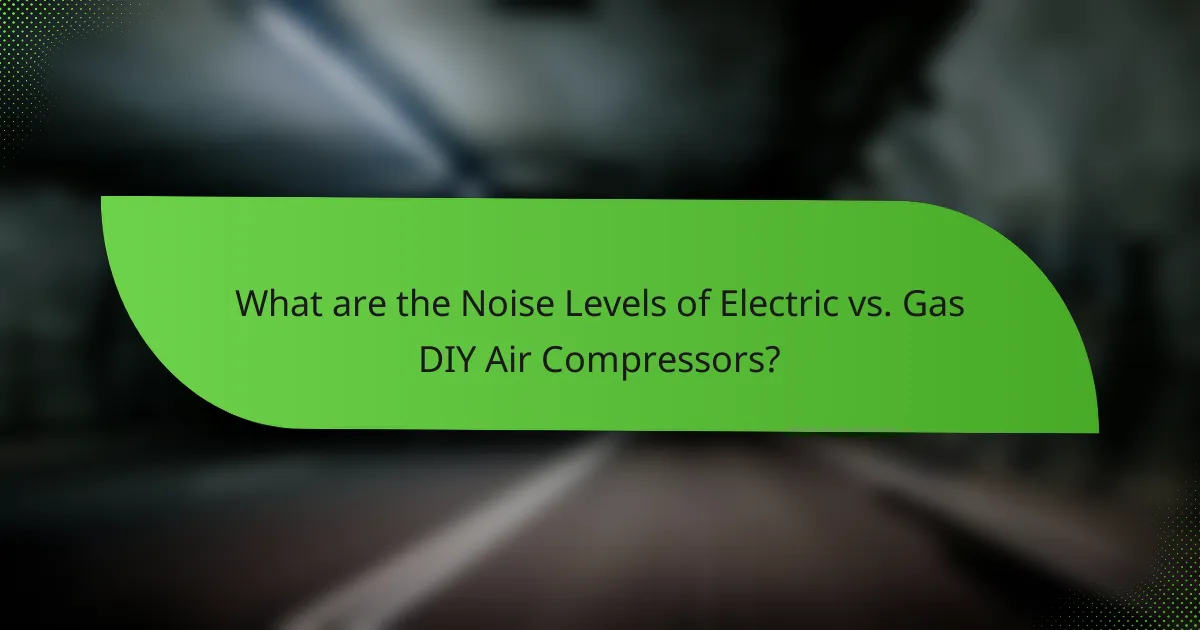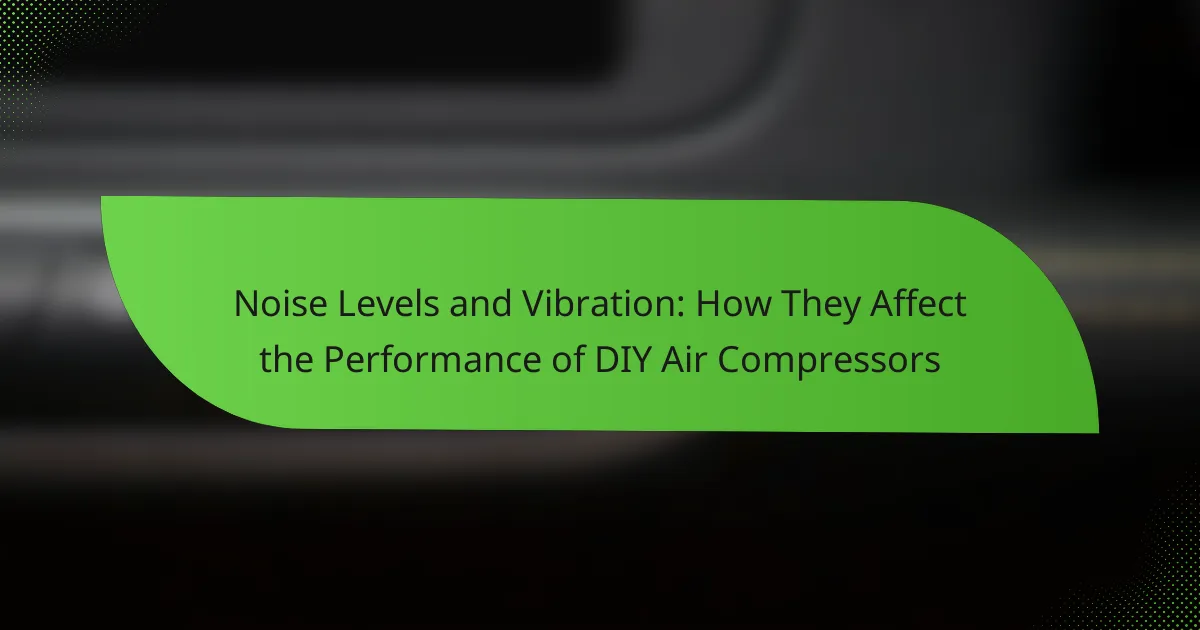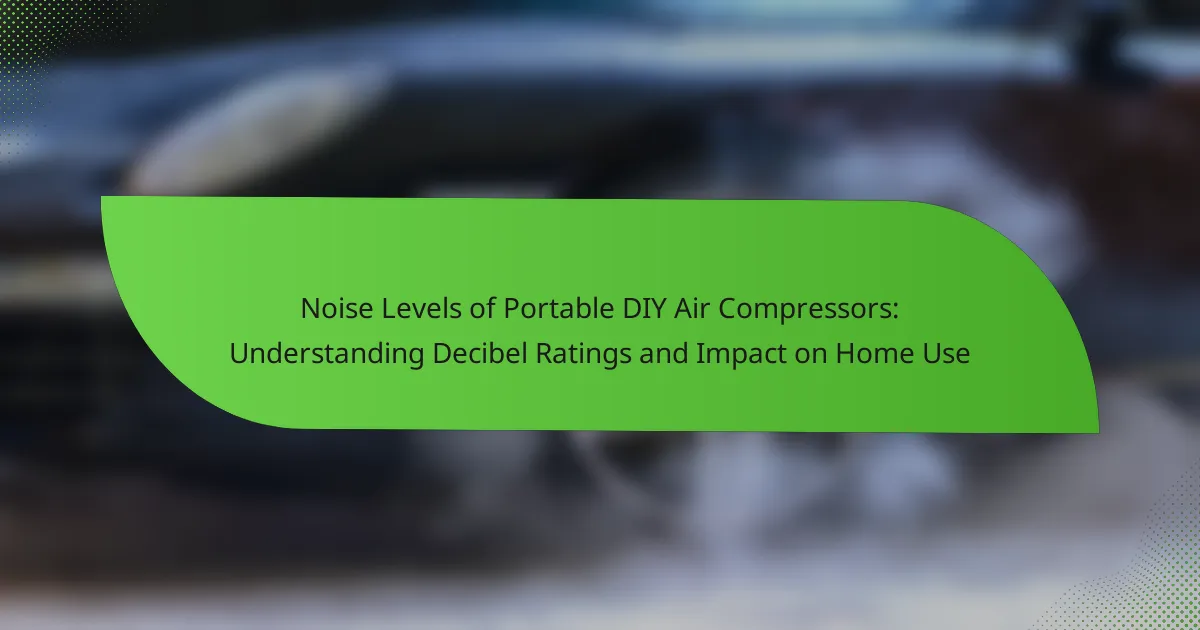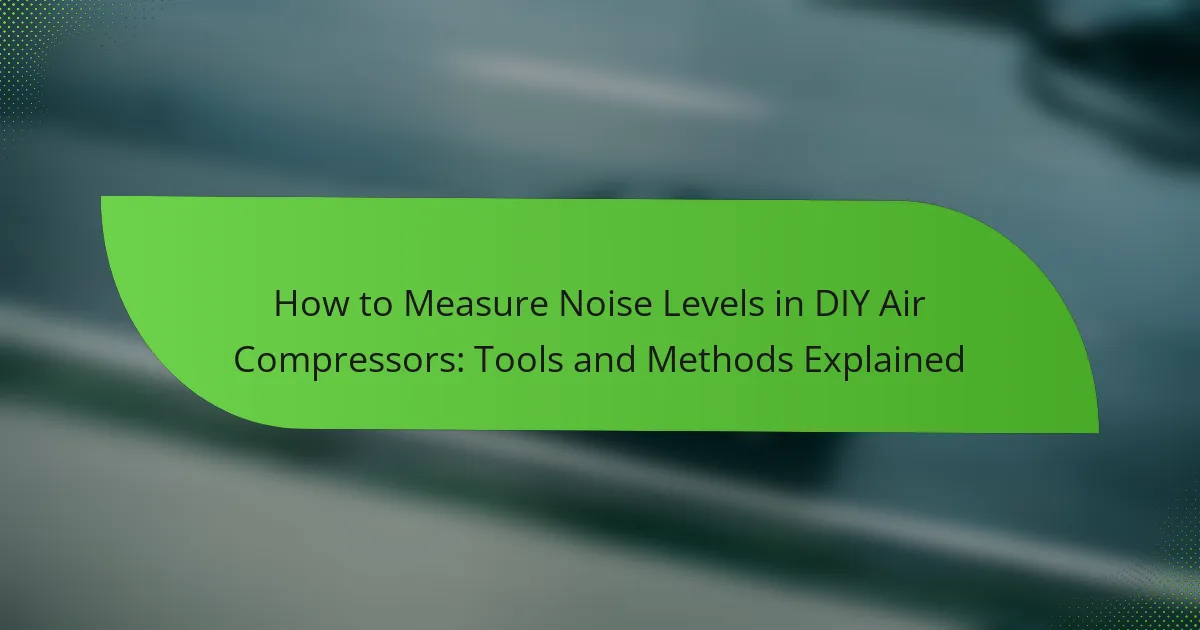The article examines the noise levels associated with electric and gas DIY air compressors. Electric DIY air compressors operate at noise levels ranging from 60 to 75 decibels, making them quieter and more suitable for indoor use. In contrast, gas DIY air compressors produce noise levels between 80 and 90 decibels, which can lead to user discomfort and potential hearing damage with prolonged exposure. The article highlights the importance of considering noise levels when selecting an air compressor to ensure health and comfort in various environments.

What are the Noise Levels of Electric vs. Gas DIY Air Compressors?
Electric DIY air compressors typically operate at noise levels ranging from 60 to 75 decibels. Gas DIY air compressors, on the other hand, usually produce noise levels between 80 and 90 decibels. This means electric models are generally quieter than gas models. The quieter operation of electric compressors makes them more suitable for indoor use. In contrast, gas compressors are often louder due to their engine operation. The difference in noise levels can impact user experience and neighborhood disturbance. Studies indicate that prolonged exposure to noise above 70 decibels can lead to hearing damage. Therefore, selecting a quieter compressor can be beneficial for health and comfort.
How do noise levels vary between electric and gas air compressors?
Electric air compressors generally operate at lower noise levels compared to gas air compressors. Electric models typically produce noise levels ranging from 60 to 75 decibels. In contrast, gas air compressors can generate noise levels between 80 and 90 decibels. This difference in noise is due to the combustion engine in gas compressors, which inherently creates more sound. Electric compressors use electric motors, which are quieter in operation. Studies have shown that prolonged exposure to higher decibel levels can lead to hearing damage. Therefore, when considering noise levels, electric air compressors are often the preferred choice for quieter environments.
What factors influence the noise output of air compressors?
The noise output of air compressors is influenced by several factors. These factors include the type of compressor, its design, and the motor size. Electric compressors generally produce less noise than gas-powered ones. The materials used in construction also affect noise levels. For instance, sound-dampening materials can significantly reduce noise. Additionally, the operational pressure and flow rate contribute to the overall noise output. Higher pressure settings typically generate more noise. Lastly, maintenance plays a role; poorly maintained compressors can be noisier than well-maintained ones.
How do specific models compare in terms of decibel ratings?
Electric air compressors typically operate at lower decibel ratings than gas models. For example, electric models range from 60 to 80 decibels. In contrast, gas air compressors usually range from 75 to 95 decibels. This means that electric models are generally quieter. Specific models like the California Air Tools 6010LFC operate at 60 decibels. Meanwhile, the DeWalt D55146 gas compressor can reach up to 95 decibels. These differences indicate that electric compressors are often preferred for noise-sensitive environments.
Why is noise level an important consideration for DIY projects?
Noise level is an important consideration for DIY projects because it affects the working environment and the comfort of individuals nearby. High noise levels can lead to hearing damage over time, as exposure to sounds above 85 decibels is considered hazardous. Additionally, excessive noise can disturb neighbors and violate local noise ordinances. For projects requiring prolonged use of tools, quieter options can enhance focus and productivity. Studies show that lower noise levels can reduce stress and fatigue during work. Therefore, selecting quieter tools can improve overall project experience and safety.
How can excessive noise impact the work environment?
Excessive noise can significantly disrupt the work environment. It leads to decreased concentration among employees. Research indicates that noise levels above 85 decibels can impair cognitive function. This can result in lower productivity and increased errors. Additionally, prolonged exposure to high noise levels can cause stress and fatigue. A study by the World Health Organization highlights that excessive noise contributes to health issues. These include hypertension and sleep disturbances. Consequently, managing noise levels is crucial for maintaining a healthy work environment.
What regulations or guidelines exist regarding noise levels in residential areas?
Regulations regarding noise levels in residential areas vary by location. Many municipalities have established noise ordinances to limit sound levels during specific hours. Common guidelines often set maximum decibel levels for residential zones, typically ranging from 50 to 65 dB during daytime and lower levels at night. Enforcement of these regulations can involve fines or other penalties for excessive noise. Local governments may also provide specific exemptions for construction, lawn care, or public events. Residents are encouraged to report violations to local authorities for investigation. These regulations aim to balance community peace with individual activities.
What are the common uses for electric and gas DIY air compressors?
Electric and gas DIY air compressors are commonly used for inflating tires and sports equipment. They are also utilized for powering pneumatic tools like nail guns and spray guns. Additionally, these compressors can assist in cleaning tasks by providing a strong air stream. Electric models are preferred for indoor use due to their quieter operation. Gas models are often chosen for outdoor projects where portability is crucial. Both types can be used for painting and applying finishes. Their versatility makes them valuable for various DIY projects and maintenance tasks.
How does the intended use affect the choice between electric and gas compressors?
The intended use significantly affects the choice between electric and gas compressors. Electric compressors are generally more suitable for indoor use due to their lower noise levels and emissions. They are ideal for tasks like inflating tires or powering air tools in a garage. Gas compressors, on the other hand, are preferred for outdoor applications requiring portability and higher power. They can operate in remote locations without electricity. For example, construction sites often utilize gas compressors for their ability to run for extended periods. Thus, the specific requirements of the task dictate the appropriate compressor type.
Which applications benefit most from quieter operation?
Applications that benefit most from quieter operation include residential environments, offices, and medical facilities. In residential settings, quieter operation reduces noise pollution and enhances comfort. Offices require a peaceful atmosphere for productivity and concentration. Medical facilities, such as hospitals and clinics, prioritize quiet to avoid disturbing patients. Additionally, workshops and studios benefit from reduced noise to maintain focus and creativity. Quieter operation in these settings leads to improved well-being and efficiency.
How do electric and gas compressors differ in terms of noise reduction features?
Electric compressors generally have better noise reduction features compared to gas compressors. Electric compressors operate more quietly due to their design, which often includes sound-dampening materials and enclosed motors. In contrast, gas compressors produce more noise because of their combustion engines. The engine’s operation generates higher decibel levels, making them louder in comparison. Studies indicate that electric compressors can operate at noise levels as low as 60 dB, while gas compressors may reach up to 90 dB or more. This significant difference in noise levels is a key factor for users seeking quieter options for DIY projects.
What technologies are available to minimize noise in air compressors?
Technologies available to minimize noise in air compressors include soundproof enclosures, vibration isolation mounts, and quieter compressor designs. Soundproof enclosures can significantly reduce noise levels by containing sound within a barrier. Vibration isolation mounts help minimize noise caused by vibrations during operation. Quieter compressor designs utilize advanced engineering to lower operational noise. These technologies are often implemented in both electric and gas compressors to enhance user experience. Research indicates that soundproofing can reduce noise levels by up to 20 dB. This demonstrates the effectiveness of these technologies in minimizing noise.
How do design and construction affect noise levels in compressors?
Design and construction significantly influence noise levels in compressors. The materials used in compressor construction can absorb or transmit sound differently. For instance, metal casings may amplify noise, while insulated enclosures can dampen it. The design of the compressor, including its internal components, affects vibration and noise generation. Compressors with rubber mounts tend to produce less noise due to vibration isolation. Additionally, the arrangement of parts within the compressor can impact airflow and reduce turbulence, which contributes to noise. Studies show that well-designed compressors can operate 10-20 dB quieter than poorly designed counterparts. Therefore, effective design and construction are crucial for minimizing noise in compressors.
What are the best practices for choosing a quieter air compressor?
When choosing a quieter air compressor, prioritize models with low decibel ratings. Look for compressors that operate below 70 dB for reduced noise. Consider electric compressors, as they typically generate less noise than gas models. Evaluate the compressor’s design; models with sound-dampening features are often quieter. Research user reviews to identify models known for their low noise levels. Check for specifications that highlight noise reduction technologies, such as enclosed motors. Select a compressor with a lower RPM, as this generally results in quieter operation. Lastly, ensure proper placement and insulation to further minimize noise impact during use.
What should consumers look for in terms of noise ratings?
Consumers should look for the decibel (dB) rating when evaluating noise levels. A lower dB rating indicates a quieter compressor. Electric compressors typically operate between 60 to 75 dB. Gas compressors often exceed 80 dB, making them louder. Consumers should also consider the noise level during operation, as this affects comfort. Checking for sound insulation features can help reduce perceived noise. Reviews and specifications provide insights into real-world noise performance. Ultimately, understanding these factors aids in selecting a suitable compressor for noise sensitivity.
How can users effectively reduce noise when operating an air compressor?
Users can effectively reduce noise when operating an air compressor by utilizing soundproof enclosures. These enclosures can significantly dampen the noise produced during operation. Additionally, placing the compressor on rubber mats can minimize vibrations and further reduce sound transmission. Using quieter models, such as those specifically designed for low noise levels, is also beneficial. Regular maintenance, including checking for loose components, can help maintain optimal efficiency and reduce unnecessary noise. According to a study by the American Society of Heating, Refrigerating and Air-Conditioning Engineers, soundproofing can reduce noise levels by up to 10 decibels, enhancing the overall user experience.
The main entity of this article is the noise levels of electric and gas DIY air compressors. Electric compressors typically operate at noise levels between 60 to 75 decibels, making them quieter and more suitable for indoor use, while gas compressors generate noise levels ranging from 80 to 90 decibels due to their combustion engines. Key factors influencing noise output include compressor type, design, and maintenance, with specific models demonstrating significant variations in decibel ratings. The article also discusses the importance of noise levels for user comfort and health, as well as best practices for selecting quieter compressors and minimizing noise during operation.



